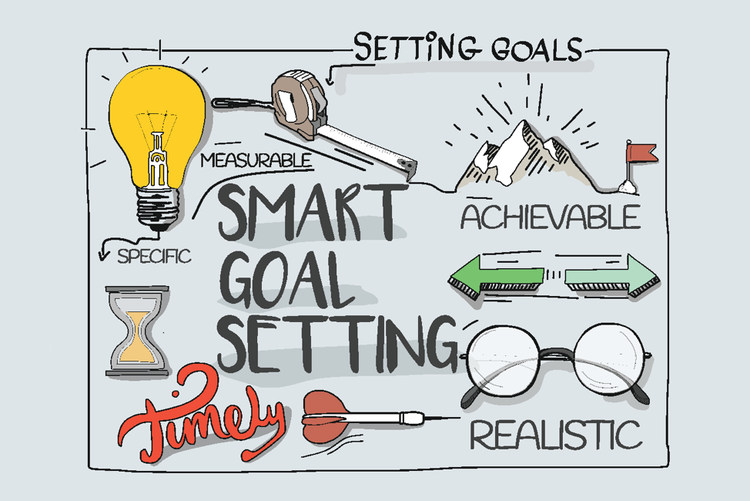Setting goals is highly important for focusing our attention and directing our effort towards specific incremental achievements that confer a sense of direction to our strive for success. In order to have realistic expectations, it is useful to distinguish between different types of goals. As mentioned on the page of the CALE Learning Enhancement of Eastern Washington University, there are 3 major types of goals: process goals, performance goals, and outcome goals.
An example of the first is studying a given number of hours every day - process goals are 100% controllable. An example of the second is setting a specific minimum level of performance for an activity you carry out, for instance running at a certain speed for half an hour every day or obtaining a high grade - these goals are mostly controllable. Outcome goals are much harder to control or guarantee - an example could be getting admitted to an Ivy League college, succeeding in a specific career, or having a successful marriage. In this case, although a lot depends on us, there are also many unknown variables. Below we list some basic rules for successful goal setting that can maximize the chances of achieving your goals.
S.M.A.R.T Goals
Specific
Successful goals setting involves defining very specifically what one wants to do or achieve. This involves answering the questions “what?”, “when?”, ”who?”, “where?”, and “why?” among others. Instead of choosing to “work more on math”, opt for “work on assigned exercises on derivatives and integrals for 40 minutes every Tuesday and Thursday”.
Measurable
Successful goals should be measurable. This ensures that the process of reaching them brings a sense of progress and achievement. The latter is instrumental for motivating people and ensuring that effort is sustained over longer periods of time. Without doing this, one might feel like trying to empty the ocean with a spoon - one spoon more or one spoon less wouldn’t make any difference. Also, by making the goals measurable, one can plan the rewards accordingly.
Achievable
Whether your goals are academic or related to sports, they must be achievable, which means they shouldn’t be overly distant or demanding. This is because hard goals can do quite the opposite and demotivate us. It is like looking at the tip of the mountain from the base camp. It is essential to split big goals into smaller ones that would enable one to advance with small increments. Also you can find good topics to write about your story. Yet another important lifehack is to deal with such hard goals by setting small process-related goals, for instance, dedicating 2 hours every day to grammar exercises aimed at mastering a foreign language.
Realistic
Set goals that you’ll be able to achieve given your circumstances and abilities. If you were never able to read 200 pages per day, it is simply not wise to set such a daily goal for the next month, otherwise, you’ll have to revisit it in no time. Also note that even if you are very seriously intended, there are other urgent or important tasks that might distract you temporarily from your goals, hence, you must factor in this possibility.
Time-Related
Setting deadlines helps to prioritize certain goals over others but also helps to treat goals more responsibly. Specify how much time would be allocated for each goal and on what day(s) of the calendar. Even when we do our best to estimate realistic timeframes, we often fail or are confronted with unexpected events. This might happen to students in college, as they are confronted with one of the most effort-intensive projects they have ever faced - writing a dissertation. Fortunately, there are platforms that can find sites to detect plagiarism, so that a deadline which is about to be missed ends with a hard lesson instead of a failure to graduate after all the years spent studying.
Conclusion
Above, we list only a few tips for successful goal setting - in reality, there are hundreds if not thousands of books written on this. Also, check out some TED Talks related to this topic. However, it is important that, amidst this productivity enhancement frenzy, we don’t become goal-setting fanatics. Not everything in our lives should be measured and planned. For instance, how would the children react if they found out that their parents planned their Disney trip or bought a certain Christmas gift as part of a carefully calculated goal to get closer to them and not just as an act of love or care, perhaps even spontaneous?
Even in a professional context, setting goals should not blindfold us - following a set “inviolable” goals with religious fanaticism and zeal can do just that. Sometimes, in life, obtaining really great achievements requires us to take a step back, often, because our understanding of the situation might change. In addition, as mentioned, there are many things that we have no control over. Being wise often means letting go of some goals that prove out to be the unattainable and only act to hold us back in our growth.
Author’s Bio
Connie has experience working in the content writing industry and has a good understanding of what the corresponding online platforms and services can offer to different types of clients. This relates to business professionals, market analysts, advertisers, students, etc. As this industry is a key provider of freelancing jobs, Connie writes about what it is like to work as a freelancer in each of these specializations.



